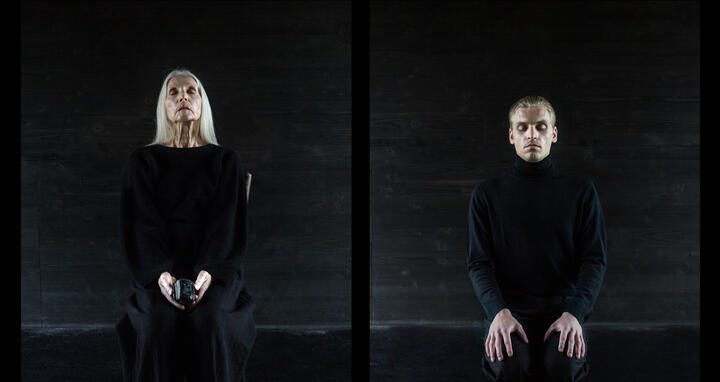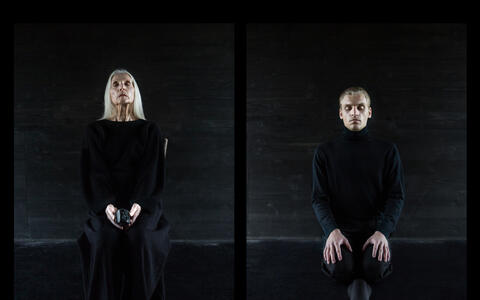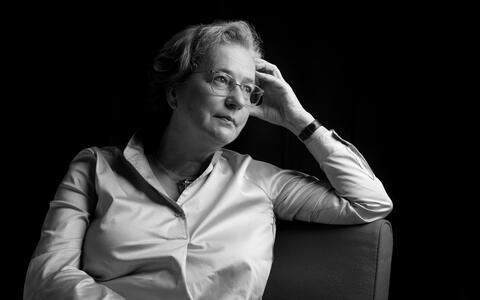Forever young - forever healthy?
Pandemics, climate crises and war make the fragility of life clearly tangible. At the same time, we are mobilizing unforseen forces to find new forms that make life - still - worth living. "still, LIFE IS LIFE" is therefore the title of the Salon Sophie Charlotte 2022. On the evening of 21 May 2022, from 18:00 to midnight, the Berlin-Brandenburg Academy of Sciences and Humanities (BBAW) invites you to discuss the question of measuring and shaping life.
The Max Delbrück Center for Molecular Medicine in the Helmholtz Association (MDC) is participating in the Salon Sophie Charlotte for the first time. On the first floor of the BBAW (Room 3) the Centre will be offering two perspectives on the possibilities that editing the genetic material with CRISPR opens up for us: that of the artist Emilia Tikka and that of the researcher and physician Simone Spuler.
ÆON – Trajectories of Longevity and CRISPR
Photo from the artwork ÆON
As artist in residence in the MDC labs, Emilia Tikka was able to experience and try out for herself what CRISPR can already do. Based on this experience in 2018, the Finnish artist has created a speculative scenario of a possible future with her work "ÆON - Trajectories of Longevity and CRISPR":
A man, a woman. Two lovers. He is young, and he will stay that way. Thanks to CRISPR/dCas9. She, on the other hand, is growing old and has decided against eternal youth. And you? What would you do: inhale and choose immortality? Emilia Tikka would like to use ÆON to encourage reflection on a possible future. From 19:30 she will be joining salon guests to discuss, parts of her artwork that will be on display from 18:00.
Understanding and changing: The future of genome research
Simone Spuler
For patients with genetic muscle diseases, eternal youth is not the issue. Professor Simone Spuler wants to save them from the deterioration of their muscle tissue – or even repair it. For diseases previously considered incurable, there could at least be some relief thanks to stem cells and CRISPR/Cas9.
Simone Spuler conducts research at the Experimental and Clinical Research Center, a joint facility of the MDC and the Charité – Universitätsmedizin in Berlin-Buch. The team lead by the physician cares for some 2000 patients in a university outpatient clinic. At the same time, Spuler heads the "Myology" research group, where she is laying the foundations for first therapeutic approaches.
She knows that gene therapies not only raise hopes, but also trigger fears. In her lecture starting at 21:00 she will therefore discuss the technical and ethical limits of her work and looks forward to sharing the views of the Salon guests.
Quiz: Snip, snip – the gene has gone
Are you familiar with genetic scissors? Have you followed the controversies surrounding this technology in recent years? With the quiz "Snip, snip – the gene has gone", MDC aims to test the ingenuity of Salon visitors. On ten quiz cards in our exhibition room, they can find out what CRISPR can already achieve, what is possible, and what is and remains in the realm of fantasy.
Zeit und Ort
Forever young - forever healthy?
21 May 2022, 18:00 to midnight at the Salon Sophie Charlotte
Berlin-Brandenburg Academy of Sciences and Humanities (BBAW)
Markgrafenstraße 38, 10117 Berlin
First floor, room 3
Further information
- Salon Sophie Charlotte 2022 „still, LIFE IS LIFE“ (registration required)
- Portrait of Simone Spuler: "A Pioneer in Muscle Repair”
- About the project by Emilia Tikka: "Eternal youth?"
Contact
Jana Schlütter
Editor, Communication Department
Max Delbrück Center for Molecular Medicine in the Helmholtz Association (MDC)
Phone: +49 30 9406-2121
jana.schluetter@mdc-berlin.de or presse@mdc-berlin.de
- Max Delbrück Center for Molecular Medicine in the Helmholtz Association (MDC)
-
-
The Max Delbrück Center for Molecular Medicine in the Helmholtz Association (MDC) is one of the world’s leading biomedical research institutions. Max Delbrück, a Berlin native, was a Nobel laureate and one of the founders of molecular biology. At the MDC’s locations in Berlin-Buch and Mitte, researchers from some 60 countries analyze the human system – investigating the biological foundations of life from its most elementary building blocks to systems-wide mechanisms. By understanding what regulates or disrupts the dynamic equilibrium in a cell, an organ, or the entire body, we can prevent diseases, diagnose them earlier, and stop their progression with tailored therapies. Patients should benefit as soon as possible from basic research discoveries. The MDC therefore supports spin-off creation and participates in collaborative networks. It works in close partnership with Charité – Universitätsmedizin Berlin in the jointly run Experimental and Clinical Research Center (ECRC), the Berlin Institute of Health (BIH) at Charité, and the German Center for Cardiovascular Research (DZHK). Founded in 1992, the MDC today employs 1,600 people and is funded 90 percent by the German federal government and 10 percent by the State of Berlin.








